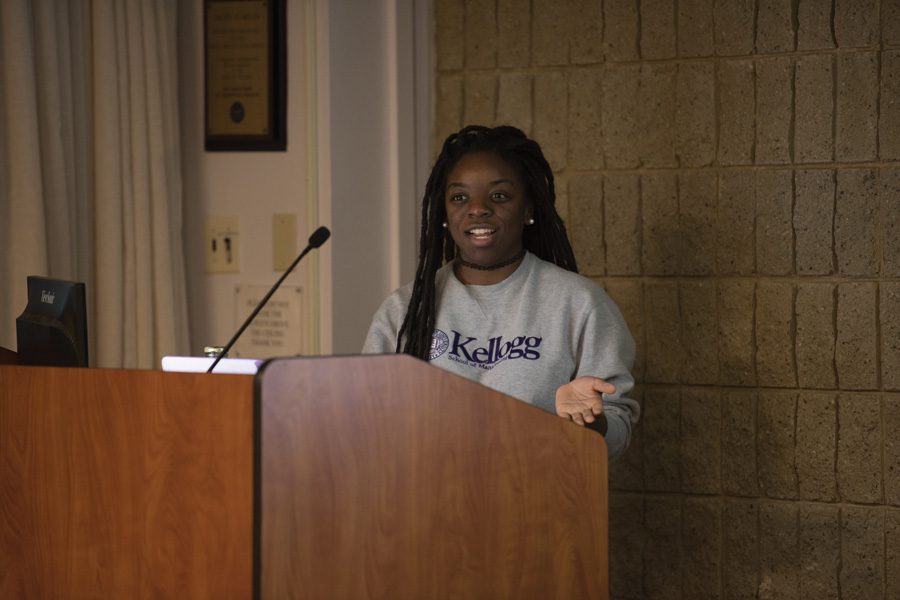Black Lives Matter panel examines role of social inaction, activism in supporting community issues
Allie Goulding/The Daily Northwestern
Communication senior Danielle Harris discusses methods for transforming passive activism into social progress at an event Thursday. “From Slacktivism to Activism: Combatting Social Inaction” discussed how to use resources, gain knowledge and get involved in a meaningful manner.
January 13, 2017
Although “slacktivism” itself is not harmful, activists need to take a more engaged role in social justice movements, panel participants said at a discussion Thursday.
The event, co-hosted by Northwestern College Democrats and Multicultural Filmmakers Collective, focused on methods for transforming well-meaning intentions into tangible activism. The event was part of Black Lives Matter, a Northwestern Dialogue, which is a student-led and administrator-backed series on the state of black lives in the country and the Black Lives Matter movement spanning two weeks. About a dozen people attended Thursday’s event.
Event organizers Sami Rose and Danielle Harris began the evening by defining the term slacktivism as passive support of a cause, and they mentioned challenges faced by people who want to be activists but can’t bring themselves to get involved.
Harris, programming chair of Multicultural Filmmakers Collective, said activism can feel ableist at times because not everyone has the ability to physically go out and protest.
“It’s hard to really say activism is one thing because there are all these stipulations and terms of conditions,” she said.
Rose, co-president of College Democrats, said obligations such as jobs and school can also prevent people from taking that first step in getting involved. The Communication senior added that because activism is an aggregate of individual actions, even the smallest steps can make a difference.
Harris said a lack of knowledge on social issues can make people hesitant when deciding to get involved. Learning about issues on the internet, reading books on social issues and attending meetings related to social justice are all ways to get educated, the Communication senior said.
“When you’re entering a space that isn’t a space you’re not accustomed to being in, listening and observing is key,” Harris said.
Rose said an abundance of campus resources — the library, Associated Student Government and other student groups –– make it easier for Northwestern students to take a more involved role in activism.
She added that engaging with national organizations such as Planned Parenthood, which already have preexisting frameworks for enacting change, allows people with no prior activist experience to contribute to a cause.
Rose echoed Harris’ advice to self-educate and suggested that people learn the names of their state representatives and contact them if they feel an issue needs solving.
“Badgering your representatives, that’s where a lot of change happens,” she said. “People don’t realize that a lot of the laws that affect your day-to-day life are happening in your local community.”
Both Rose and Harris stressed the importance of working toward policy changes and legislation within one’s local community, whether that be in Evanston or elsewhere.
Although posting hashtags like “#OscarsSoWhite” and using social media to organize for a social cause can enact real change, people have a duty to do more, Rose said. Because many people interact on social media with those who think similarly to them, posting about social causes sometimes does little more than shouting into an echo chamber, she said.
Medill junior Christian Welch, who attended the event, said though posting progressive Facebook statuses or expressing verbal support for a cause isn’t inherently problematic, it can often stand in the way of real change.
“Slacktivism itself isn’t bad; it’s just that people are mistaking it for activism,” Welch said. “I’m definitely inspired to get more educated on causes that I want to support.”
Email: [email protected]
Twitter: @jakeholland97


